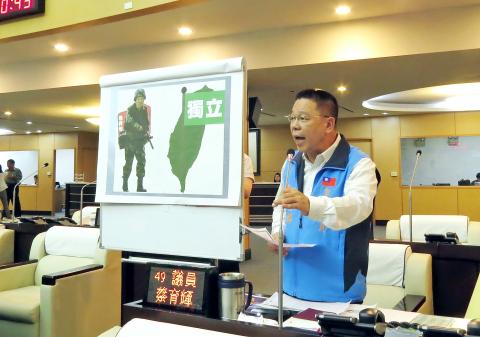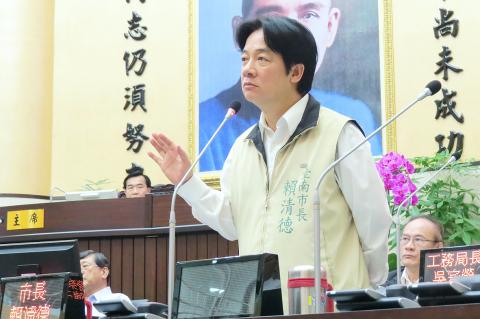The Chinese Nationalist Party (KMT) legislative caucus yesterday accused Democratic Progressive Party (DPP) presidential candidate Tsai Ing-wen (蔡英文) of playing a two-handed strategy to deceive voters into supporting her by pledging to maintain the cross-strait “status quo,” while letting Tainan Mayor William Lai (賴清德) advocate Taiwanese independence.
“Lai [of the DPP] said on Wednesday that he supports independence, but not the use of force. Given that his stance is contradictory to that of his chairperson, the caucus demands that Tsai gives the public a clear explanation on the matter,” KMT deputy caucus whip Lin Te-fu (林德福) told a morning press conference in Taipei.
Accusing Tsai and Lai of collaborating to cheat voters, Lin said that the KMT’s definition of the “status quo” is based on the “three noes” policy of “no independence, no unification and no use of force,” as well as the so-called “1992 consensus,” referring to a tacit understanding between the KMT and the Chinese government that both sides of the Taiwan Strait acknowledge there is “one China,” with each side having their own interpretation of what “one China” is.

Photo: Tsai Wen-chu, Taipei Times
Refusal to accept the “1992 consensus” alone could enrage the leadership in China, Lin said.
“The KMT really wants to see Taiwanese being able to live and work in peace on this island,” he said.
KMT caucus whip Lai Shyh-bao (賴士葆) said there is a deeper meaning behind Lai’s declaration of support for independence on Wednesday, as it was the eighth anniversary of the DPP’s passage of the “Normal Country Resolution.”

Photo: Tsai Wen-chu, Taipei Times
The resolution advocates renaming the country “Taiwan” and the enactment of a new constitution, Lai Shyh-bao said, adding that the mayor’s comments showed Tsai’s pledge to maintain the “status quo” was nothing but a ploy to gain votes.
“Having an influential politician like William Lai make such a politically sensitive statement on this particular date ... we suspect that they are playing a two-handed strategy,” Lai Shyh-bao said.
“We believe Tsai is responsible for attracting swing voters with her promise of maintaining the ‘status quo,’ while the mayor is in charge of reassuring ‘deep-green’ voters by reiterating the party’s pro-independence stance,” he said.
He added that the mayor might have made the statement in an attempt to shift public focus away from the escalating outbreak of dengue fever in the south.
Citing a July survey conducted by the Mainland Affairs Council (MAC), KMT Legislator Wu Yu-sheng (吳育昇) said that 72.2 percent of respondents supported maintaining the “status quo” based on the “three noes” policy.
“That means the mayor’s claim that independence has received the maximum consensus among Taiwanese is nonsense and an outright lie,” Wu said.
MAC Minister Andrew Hsia (夏立言) said that the government’s stance has always been clear: that the cross-strait status of “no independence, no unification and no use of force” be maintained based on the “1992 consensus,” the principle of “one China, with different interpretations” and the Constitution.
“Cross-strait relations have stabilized and prospered over the past seven years. We hope that everyone will cherish this stance,” Hsia said.
KMT presidential candidate Hung Hsiu-chu (洪秀柱) said William Lai has remained unwavering in his support of Taiwanese independence.
“On the contrary, Tsai has repeatedly shifted her stance on the issue, from the 1999 “special state-to-state” theory and reference to the Republic of China [ROC] government as “a government-in-exile,” to the DPP’s vows to safeguard the existence of the ROC,” Hung said.
"I do not know whether Tsai and the mayor have some sort of tacit agreement, or are they playing ‘good cop, bad cop,’” Hung added.
Asked whether his remarks could impact the tourism industry, William Lai said in Tainan that the country must seek to be self-reliant, as overdependence on others would always result in it being held over a barrel.
“The DPP’s ‘1999 Resolution on Taiwan’s Future’ states that Taiwan is an independent, sovereign state called the ROC [Republic of China] and that its future must be decided by its own people,” the mayor said.
Tsai said she has made her cross-strait policy platform clear.
“As a presidential candidate, I have made my cross-strait policy idea very clear during my speech at the Center for Strategic and International Studies in the US,” Tsai told reporters. “It is to push for peaceful and stable development of cross-strait relations in line with public opinion under the current constitutional framework of the ROC.”
She added that William Lai’s remarks should not be overinterpreted, as the mayor only seeks mutual understanding and peaceful coexistence across the Strait.
Asked if the mayor’s remarks would have any impact on the DPP, Tsai said that sometimes, it is just a “question of definition,” adding that the consensus in Taiwanese society is in line with her ideas.

NATIONAL SECURITY THREAT: An official said that Guan Guan’s comments had gone beyond the threshold of free speech, as she advocated for the destruction of the ROC China-born media influencer Guan Guan’s (關關) residency permit has been revoked for repeatedly posting pro-China content that threatens national security, the National Immigration Agency said yesterday. Guan Guan has said many controversial things in her videos posted to Douyin (抖音), including “the red flag will soon be painted all over Taiwan” and “Taiwan is an inseparable part of China,” while expressing hope for expedited “reunification.” The agency received multiple reports alleging that Guan Guan had advocated for armed reunification last year. After investigating, the agency last month issued a notice requiring her to appear and account for her actions. Guan Guan appeared as required,

DAREDEVIL: Honnold said it had always been a dream of his to climb Taipei 101, while a Netflix producer said the skyscraper was ‘a real icon of this country’ US climber Alex Honnold yesterday took on Taiwan’s tallest building, becoming the first person to scale Taipei 101 without a rope, harness or safety net. Hundreds of spectators gathered at the base of the 101-story skyscraper to watch Honnold, 40, embark on his daredevil feat, which was also broadcast live on Netflix. Dressed in a red T-shirt and yellow custom-made climbing shoes, Honnold swiftly moved up the southeast face of the glass and steel building. At one point, he stepped onto a platform midway up to wave down at fans and onlookers who were taking photos. People watching from inside

A Vietnamese migrant worker yesterday won NT$12 million (US$379,627) on a Lunar New Year scratch card in Kaohsiung as part of Taiwan Lottery Co’s (台灣彩券) “NT$12 Million Grand Fortune” (1200萬大吉利) game. The man was the first top-prize winner of the new game launched on Jan. 6 to mark the Lunar New Year. Three Vietnamese migrant workers visited a Taiwan Lottery shop on Xinyue Street in Kaohsiung’s Gangshan District (崗山), a store representative said. The player bought multiple tickets and, after winning nothing, held the final lottery ticket in one hand and rubbed the store’s statue of the Maitreya Buddha’s belly with the other,

‘NATO-PLUS’: ‘Our strategic partners in the Indo-Pacific are facing increasing aggression by the Chinese Communist Party,’ US Representative Rob Wittman said The US House of Representatives on Monday released its version of the Consolidated Appropriations Act, which includes US$1.15 billion to support security cooperation with Taiwan. The omnibus act, covering US$1.2 trillion of spending, allocates US$1 billion for the Taiwan Security Cooperation Initiative, as well as US$150 million for the replacement of defense articles and reimbursement of defense services provided to Taiwan. The fund allocations were based on the US National Defense Authorization Act for fiscal 2026 that was passed by the US Congress last month and authorized up to US$1 billion to the US Defense Security Cooperation Agency in support of the